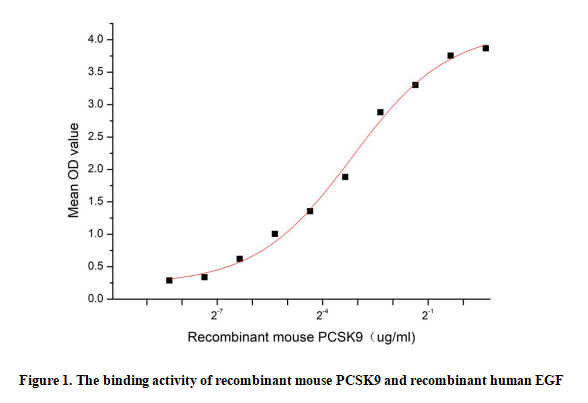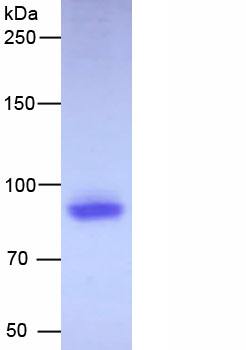Active Proprotein Convertase Subtilisin/Kexin Type 9 (PCSK9)
FH3; HCHOLA3; NARC1; Hypercholesterolemia,Autosomal Dominant 3; Neural apoptosis-regulated convertase 1; Proprotein convertase 9; Subtilisin/kexin-like protease PC9
- Product No.APE189Mu01
- Organism SpeciesMus musculus (Mouse) Same name, Different species.
- Buffer FormulationPBS, pH7.4, containing 0.01% SKL, 5% Trehalose.
- Traits Freeze-dried powder
- Purity> 90%
- Isoelectric Point7.5
- ApplicationsCell culture; Activity Assays.
- DownloadInstruction Manual
- UOM 10µg50µg 200µg 1mg 5mg
- FOB
US$ 236
US$ 590
US$ 1180
US$ 3540
US$ 8850
For more details, please contact local distributors!
ACTIVITY TEST

Proprotein Convertase Subtilisin/Kexin Type 9 (PCSK9) is one of nine mammalian serine proteases.It is secreted mostly by hepatocytes and to a lesser extent by the intestine, pancreas, kidney, adipose tissue, and vascular cells.PCSK9 can promote the degradation of LDL receptors in the liver, which in turn reduces the liver's ability to clear LDL-C from the bloodstream.Besides,Epidermal Growth Factor (EGF) has been identified as an interactor of PCSK9, thus a functional binding ELISA assay was conducted to detect the interaction of recombinant mouse PCSK9 and recombinant human EGF. Briefly, PCSK9 was diluted serially in PBS with 0.01% BSA (pH 7.4). Duplicate samples of 100 μl were then transferred to EGF-coated microtiter wells and incubated for 1h at 37℃. Wells were washed with PBST and incubated for 1h with anti-PCSK9 pAb, then aspirated and washed 3 times. After incubation with HRP labelled secondary antibody for 1h at 37℃, wells were aspirated and washed 5 times. With the addition of substrate solution, wells were incubated 15-25 minutes at 37℃. Finally, add 50 µL stop solution to the wells and read at 450/630nm immediately. The binding activity of recombinant mouse PCSK9 and recombinant human EGF was shown in Figure 1, the EC50 for this effect is 0.111ug/mL.
USAGE
Reconstitute in 10mM PBS (pH7.4) to a concentration of 0.1-1.0 mg/mL. Do not vortex.
STORAGE
Avoid repeated freeze/thaw cycles. Store at 2-8°C for one month. Aliquot and store at -80°C for 12 months.
STABILITY
The thermal stability is described by the loss rate. The loss rate was determined by accelerated thermal degradation test, that is, incubate the protein at 37°C for 48h, and no obvious degradation and precipitation were observed. The loss rate is less than 5% within the expiration date under appropriate storage condition.
GIVEAWAYS
INCREMENT SERVICES
-
 BCA Protein Quantification Kit
BCA Protein Quantification Kit
-
 Molecular Mass Marker for Protein
Molecular Mass Marker for Protein
-
 Monoclonal Antibody Customized Service
Monoclonal Antibody Customized Service
-
 Polyclonal Antibody Customized Service
Polyclonal Antibody Customized Service
-
 Protein Activity Test Experiment Service
Protein Activity Test Experiment Service
-
 Electrophoretic Mobility Shift Assay (EMSA) Experiment Service
Electrophoretic Mobility Shift Assay (EMSA) Experiment Service
-
 Buffer
Buffer
-
 Lentivirus Packaging Experiment Service
Lentivirus Packaging Experiment Service
-
 Adenovirus Packaging Experiment Service
Adenovirus Packaging Experiment Service
-
 Real Time PCR Experimental Service
Real Time PCR Experimental Service
-
 Spike RBD Protein (S-RBD)
Spike RBD Protein (S-RBD)
-
 Protein G
Protein G
-
 Protein A
Protein A
| Magazine | Citations |
| Biological Trace Element Research | Synergistic Cardioprotective Effects of Combined Chromium Picolinate and Atorvastatin Treatment in Triton X-100-Induced Hyperlipidemia in Rats: Impact on Some Biochemical Markers pubmed:28409410 |
| BASIC RESEARCH IN CARDIOLOGY | Autocrine effects of PCSK9 on cardiomyocytes Pubmed: 33169229 |
| J Transl Med | Multi-omic signatures of atherogenic dyslipidaemia: pre-clinical target identification and validation in humans 33407555 |
| Metabolism | MiR-337-3p lowers serum LDL-C level through targeting PCSK9 in hyperlipidemic mice 33775647 |
| Eur Rev Med Pharmacol Sci | Association of serum proprotein convertase Subtilisin/Kexin Type 9 (PCSK9) level with thyroid function disorders 34533801 |
| Clin Exp Hypertens | Proprotein convertase subtilisin/kexin type 9 is associated with atherosclerosis in patients with Behcet's disease Pubmed:35502687 |







